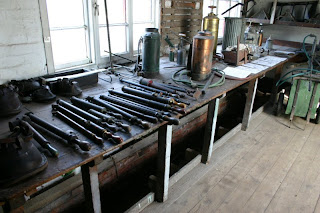It's half term so the kids need entertaining and taking advantage on the unseasonal weather we went to
Clumber Park. More specifically we spent most of the time in the Walled Kitchen Garden there - Walled Gardens, an obsession I've briefly touched on previously.
We usually manage to go there once a year or so and they're gradually bringing more and more of the garden back into use. I had a quick chat to a couple of the gardeners planting some trees against one of the walls and they're hoping to become a national centre for fruit trees specific to Nottinghamshire, Lincolnshire, Derbyshire and Yorkshire - all of which are close to the Park.
There's surprisingly little information about the Walled Garden, but at 4 acres with a 450 foot long greenhouse there's quite a bit of space for growing in! As with most gardens of this nature, it fell out of fashion and was largely neglected. Clumber Park is now owned by the National Trust who are slowly resurrecting the garden, partly to supply the restaurant on site.
Whilst the kids went on a bean hunt I took lots of pictures:
 |
| View from the entrance to the Gardens, with the greenhouse in the distance |
The walls
In a 4 acre garden there's a lot of walls to grow things up. And this garden has a lot of internal walls as well.
 |
| External wall growing pears trained on wires |
On the other side of this walls they were planting apple trees, cookers since they don't need so much sun.
 |
| Fan trained trees |
 |
| Close up of fan trained cherry |
 |
| Apples |
 |
| Not sure what these were behind the plastic as we didn't walk down this path. Peaches? |
Around the garden
 |
| Doorway |
 |
| Medlar Tree |
 |
| New veg bed in progress surrounded by step over trees |
The Greenhouse
As I mentioned, it's quite a sizeable greenhouse:
Inside there's quite a bit to see too:
 |
| The path |
 |
| Peach |
 |
| Forcing Rhubarb |
 |
| Vines - look like they've been there a while! |
Work in progress:
For those of you worried you are behind with your seed sowing, look away now!
Some History
 |
| Fruit store room, together with some spraying equipment for days gone by |
 |
| Pots used in the days before plastic |
 |
| The tea room |
Bees!
An interesting topic in Sheffield (!), but one they've embraced in this garden, They're behind netting but on a balmy almost spring like day yesterday they were busy, and as well as seeing them come and go, you could hear them too.
Looking Back
 |
| Looking back towards the garden |
Finally
 |
| The rose garden |
Even the best of gardens suffer with moles!



























